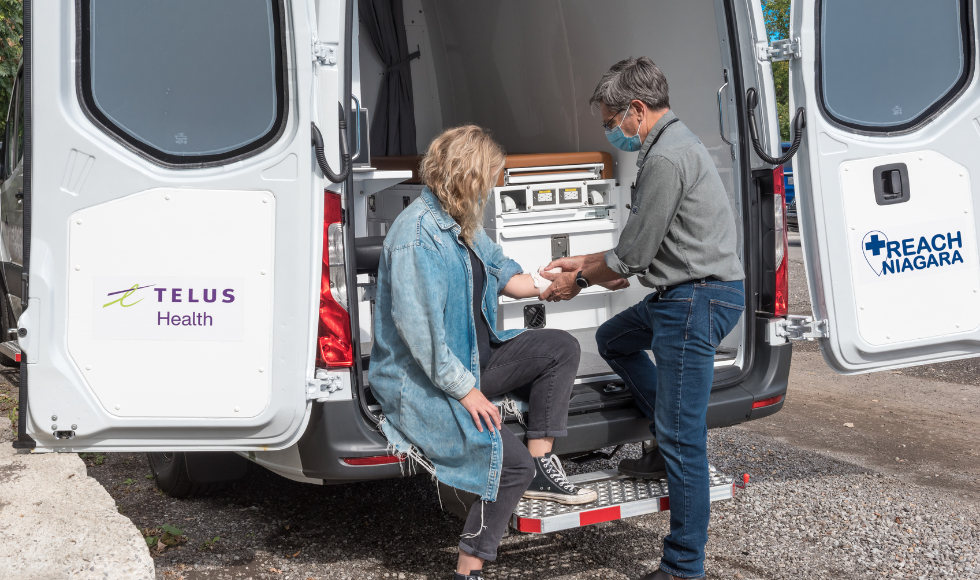Professor helps combat Niagara opioid crisis

Karl Stobbe, a clinical professor in McMaster’s Department of Family Medicine, providing care though Regional Essential Access to Connected Health (REACH) Niagara. (Photo credit: REACH Niagara)
January 11, 2023
McMaster University professor Karl Stobbe is teaming up with Niagara-area welfare agencies, McMaster’s Department of Family Medicine and the federal government to ensure a supply of safer drugs for people at risk of overdosing on opioids.
Stobbe, a clinical professor in the Department of Family Medicine, is also medical director of the Regional Essential Access to Connected Health (REACH) Niagara. REACH, which provides health care to marginalized and homeless people in the Niagara region, has received $1.2 million from Health Canada to implement and evaluate a safer supply program.
Per capita, Niagara has consistently trended in the top five regions in Ontario reporting opioid-related deaths. Niagara Public Health says there were 165 opioid-related deaths in the region in 2021, up from 93 deaths in 2019.
“Safer supply is a harm reduction approach that involves providing a pharmaceutical drug supply of known quantity and quality to people who use illegal drugs and are at a high risk of overdose and other harms,” said Stobbe.
“We have seen an increase in opioid-related deaths across the country over the last couple of years. This rise is being driven by many factors, including an increasingly toxic street drug supply and COVID-19 restrictions making it harder for people to access services.”
There has been only one physician offering safer supply to 40 individuals in St. Catharines but is unable to help more without additional resources. This project will support 40 more patients in the city centre, plus another 40 people in the rest of Niagara.
As well as safer supply, the program will offer help including primary health care, street outreach, addictions and mental health services, housing supports and peer counselling to ensure that lived experience is at the forefront of care.
This model of care focuses on creating stability for clients as they improve their health and well-being.
“I have patients asking me for this repeatedly. Many people do well in addiction programs, and with methadone. Those who don’t, now have an option other than continually risking their lives from the toxic fentanyl supply,” said Stobbe.
“Safer Supply programs in other Canadian cities have resulted in fewer overdoses, less criminal activity, increased access to housing and an improved quality of life among participants. I hope that our program will have similar effects in Niagara.”
“I see this as a light at the end of the tunnel for our high rate of opioid overdoses in Niagara.”
Chris Bittle, parliamentary secretary to the minister of Canadian Heritage and MP for St. Catharines, Ontario, said that, “every day in Canada people are needlessly dying because of a toxic illegal drug supply.”
“Safer supply pilot projects are one of many important tools that have the potential to help save lives as part of a comprehensive approach to addressing the toxic illegal drug supply that is driving overdose deaths,” he said.
“The Government of Canada is pleased to support the implementation and evaluation of the safer supply pilot project by Regional Essential Access to Connected Health Niagara which aims to do just that, while also connecting people who use drugs with a wider range of services, including primary health care, housing, and addictions and mental health supports.”
Other project partners include physician Bob McMillan, Positive Living Niagara, Gateway – Niagara Assertive Street Outreach (NASO), Community Addiction Services of Niagara (CASON) and the Niagara Region Emergency Medical Services (EMS) Community Paramedicine.


